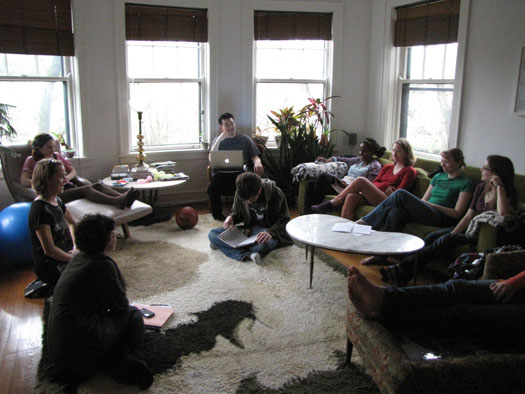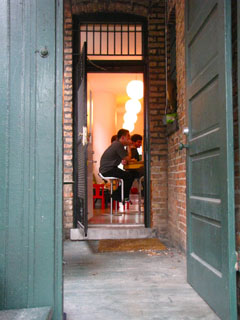Behind the scenes: August 2011 Archives
These photos from the Food for Thought course were taken by TA Stacee Kalmanovsky during last spring quarter ('11). Eating lunch with professor Laura Letinsky, sharing a meal with Theaster Gates at the Dorchester Project, and making lunch with Michael Rakowitz provided platforms and experiences for the class to delve into many aspects of art, food, and hospitality. The course culminated in the students creating and critiquing food-related projects.

This spring I was lucky to participate in Food for Thought, a class co-taught by Stephanie Smith and Laura Letinsky. The class explored relationships between food culture and contemporary art, utilizing an interdisciplinary framework. We looked at art historical representations of food, mapping the legacy of seventeenth-century still life painting onto modernist interpretations of the still life form, through cubism and Dada, and onto contemporary practices of artists revisiting these motifs, such as Daniel Speorri, and the younger artists he's influenced. The class considered food and eating as both subject and medium for art, but also as its own domain: looking at these intersections as a way to understand broader cultural concerns about production and consumption, sociality and lifestyle. We surveyed readings from social anthropology, and from popular ecologists like Michael Pollan, dealing with interactions between food and fashion: the language of "slow food," "organic," and "foodie," and trends more particular to Chicago's restaurant scene--parsing out what these labels imply about the way we live, and what implications they could have for a social, artistic practice.
A central concern was the relationship between food and performativity in contemporary art, and the different ways in which artists have used food to engage issues of hospitality, generosity, and cultural meaning in their practices. Mirroring the historical and thematic scope of Feast, we looked at the Futurists' project as marking a moment of realization in art, of actively incorporating the meal into a cultural, artistic identity through banquets and manifestos, and using the meal as a medium to give form to major political questions. We related the impulses and images that came out of 1960s-70s performance art both to the form of the Manifesto, and to issues that are getting worked out now among different contemporary art practices, about how to engage socially and critically.
The class was in many ways a collaboration between Laura and Stephanie, and our conversations benefited from their perspectives and experiences as artist and curator. Our small group ranged in academic interests and backgrounds, from first-years in the college to MA students, visual art students to economics students. This collaboration, and the gesture involved in bringing a class of students into the process of conceptualizing Feast, speaks both to the nature of the subject, and to the evolution of the project. The artist visits and meals that took place during the class, with Theaster Gates, Michael Rakowitz, and one with Laura at her apartment, help to illustrate the connections between Food for Thought and Feast, and are central to this conversation.
Continue reading Food for Thought.
 The Feast blog has been dormant for the past year--a calm that belies huge amounts of behind-the-scenes activity as we get ready for the exhibition's opening on February 16, 2012. To share that energy, we're re-launching the site with a bright new look courtesy of Jason Pickleman and JNL graphic design and fresh content by a new group of contributors. We'll pull back the curtain so you can peek into artists' studios and museum archives. We'll highlight classic older art and introduce works-in-progress commissioned especially for Feast. We'll unpack the many kinds of creative labor and collaboration that go into producing a complex exhibition like this one. And we'll look ahead to all the events that will kick off with the exhibition's opening in February and spill out onto campus and around the city until June. Watch for regular posts over the coming months.
The Feast blog has been dormant for the past year--a calm that belies huge amounts of behind-the-scenes activity as we get ready for the exhibition's opening on February 16, 2012. To share that energy, we're re-launching the site with a bright new look courtesy of Jason Pickleman and JNL graphic design and fresh content by a new group of contributors. We'll pull back the curtain so you can peek into artists' studios and museum archives. We'll highlight classic older art and introduce works-in-progress commissioned especially for Feast. We'll unpack the many kinds of creative labor and collaboration that go into producing a complex exhibition like this one. And we'll look ahead to all the events that will kick off with the exhibition's opening in February and spill out onto campus and around the city until June. Watch for regular posts over the coming months.
Ace intern Sarah Mendelsohn will lead off with posts about her participation in Food for Thought, a University of Chicago class that that Professor Laura Letinsky and I co-taught during spring quarter 2011. Laura is one of the artists featured in Feast, and we designed the course to go beyond the meal--Feast's focus--to address the broader topic of food in art. Food and its consumption form essential parts of human experience and have played a correspondingly rich role within creative cultural production over millennia--as vehicles for need and desire, purity and danger, value and lack, connection and disruption. The course considered what's at stake when contemporary artists build on this longstanding practice to explore the complexities of current societal, political, and cultural contexts.
One especially satisfying part of the course were workshops and field trips in which we prepared and shared meals together as a way to ground theoretical debates. For three of these sessions, exhibiting artists Theaster Gates, Laura Letinksy, and Michael Rakowitz met with the class to discuss their approach to artmaking and share works-in-progress for Feast. Food for Thought followed a long tradition of connecting the Smart to University teaching--from Art 101 sessions focused on objects in the collection to seminars like this one that give students intimate views into the working processes of contemporary artists. (Any current UofC students reading this: note that a revised version of the course will be offered in Spring 2012, while Feast is on view. Sign up early. Tell your friends!) More soon on the course and workshops from Sarah.